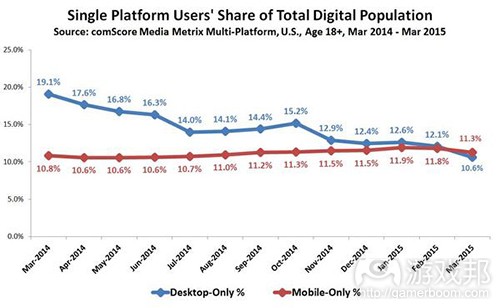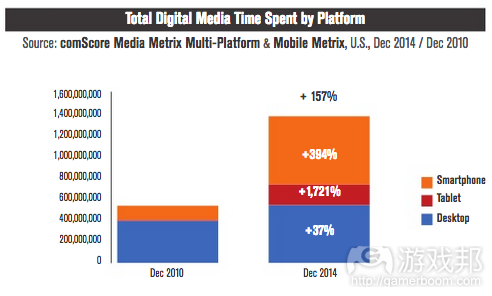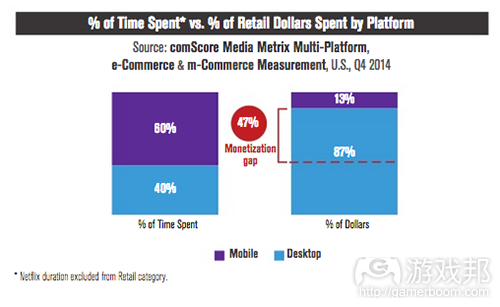每日观察:关注苹果拒绝应用新规定等消息(5.8)
1)据gamasutra报道,苹果开发者政策最近增加了一项说明,指出“在应用或元数据中提到其他移动平台名称的产品将被拒绝”,这则说明已经存在一段时间,最近苹果又再次强调了这一声明,尤其指向出现在应用中的广告。
Little White Bears工作室最近发布推文表示“苹果拒绝了我的游戏,只因为游戏中的视频广告出现了谷歌/亚马逊标志”。需要注意的是,苹果这项政策并不仅局限于iPhone应用。据MacRumors报道,另一名开发者也因为在自己的iOS应用中提到Pebble Watch(游戏邦注:这是由硅谷创业公司Pebble Technology设计的一款兼容iPhone和Android手机的智能手表)而收到相似的拒绝通知。
观察者建议开发者在向App Store发布或更新应用时,最好不要在应用商店描述或者截图等内容中提到其他平台的名称;如果应用绑定了其他视频广告,要确保广告供应商已经审核过广告内容,避免其他竞争平台的标志出现在广告中,否则就有可能遭到苹果拒绝。
2)据venturebeat报道,Epic Games前总裁Mike Capps最近宣布加入原公司主要竞争对手Unity Technologies公司,并担任后者的研究和执行团队的内部顾问。
Mike Capps将利用自己过去10年在Epic的工作经验帮助Unity扩大其游戏引擎在游戏开发领域的影响。
Epic Games的虚幻引擎以及Unity这两大开发工具一直竞争激烈,两者都已向独立开发者及业余人士推出免费工具,前者在3月份宣布虚幻引擎4将免费开放服务(商业型产品需支付5%的版税),后者随之宣布推出瞄准业余开发者的免费Unity 5个人版本。
3)ComScore最近发布的行业报告显示,2015年3月份,仅使用移动互联网的用户(11.3%)已经超过了仅使用桌面电脑的网络用户(10.6%),前者虽然仅比去年增长0.5%,后者则出现稳定下滑的趋势。
在过去一年中,用户投入平板电脑的时间增长了1721%,投入智能手机的时间则增长394%,而桌面电脑的时间仅增长37%。
报告指出用户喜欢针对不同内容使用不同设备,例如用户投入移动设备照片功能的时间占比为93%,而访问门户网站时主要使用桌面电脑(占比73%)。
尽管60%用户通过移动设备搜索相关产品,但购买转化率却仅为13%;多数用户(87%)仍然是通过桌面电脑完成支付。
4)Newzoo及onesky最近报告预测,2016年金砖四国(中国、印度、巴西、俄罗斯)手机游戏市场规模将达94亿美元,其年增幅远超全球平均水平。
2014年金砖四国手机游戏市场收益为51亿美元,年增长率为91.7%,而全球平均年增长率仅为38.9%。
俄罗斯在2014年虽遭遇通货危机,但其手机游戏在去年增幅仍达到49%;由于手机游戏玩家数量激增,预计2016年印度手机游戏市场规模将达5.716亿美元。
中国在2014年金砖四国的手机游戏收益中占比87.9%,预计到2016年中国手机游戏市场规模将达81亿美元,约为其他三国总和的6倍。
目前中国手机游戏玩家约为3.83亿,付费游戏玩家约为1.16亿。
(本文由游戏邦编译,转载请注明来源,或咨询微信zhengjintiao)
1)Apple Now Rejecting Apps for Mentioning Other Platforms
by Rob Weber
Game developers are seeing increased enforcement of section 3.1 of Apple’s developer policy which states that “Apps or metadata that mentions the name of any other mobile platform will be rejected.” Although this policy has existed for a while, it appears that there is now a stronger enforcement of it – specifically related to ads that appear in apps.
For example, Little White Bears Studios tweeted that “Apple just rejected my game for a vid ad that had Google/Amazon badges.” And it’s not just affecting apps on your phone. Recently, a developer with an app for the Pebble Watch was cited by MacRumors about receiving a similar rejection notice for mentioning Pebble in their iOS app.
There are two clear solutions which game developers can implement to ensure they comply with the guidelines and to prevent receiving a rejection notice from Apple on new submissions or updates of their game. First, if your app is available on other platforms, make sure you do not mention this in your App Store description or in your creative assets and screenshots. Second, if you are going to integrate video or other ads into your game, make sure your ad providers are actively policing all iOS ad creatives so that competing platform badges are not being shown in the ads they display inside your game. If a non-compliant ad appears during a review, you risk rejection.
Upon reviewing most of the top ad providers for games, I found objectionable ads being served on nearly all of them. We at NativeX are actively policing every ad we serve (including video creatives) so that there no ads are displayed that violate the Apple developer policy. This helps ensure that our developer’s monetization solution doesn’t negatively affect the approval process.(source:gamasutra)
2)Epic Games’ former president Mike Capps joins Unity as an internal adviser
Dale North
A former Epic Games’ president joins one his former company’s main rivals in the game-tools business.
Unity Technologies announced today that Mike Capps has joined as internal adviser to the company’s research and executive teams. This move has the industry figurehead moving from the maker of one of the most popular multiplatform game engines, Unreal Engine, to its direct competitor, which Unity CEO John Riccitiello said at the GamesBeat Summit this week sees 800 million game downloads a month. Capps will use the knowledge gained from 10 years at Epic to help Unity expand its reach into the game development world.
In a statement today, Riccitiello said that Capps will be a huge boon for Unity in democratizing game development. As competition between the top game engines heats up, both Epic Games and Unity have worked to open the door for independent game makers and hobbyists to develop on all available platforms, from mobile to VR. Epic announced in March that its Unreal Engine 4 would be free to use (with 5 percent royalties paid on commercial releases), and Unity responded with its free Unity 5 personal edition aimed at hobbyists.
“Unity is in such an enviable position in the industry,” Caps said in a statement. “I see so much exciting potential, and opportunities where I might be able to help, that this role was a logical next step. I’ll do my best to advise John and the leadership team to keep Unity’s tools driving innovation and creative self-expression in ways we can’t even imagine.”
Capps will begin work at Unity in a month, starting with a trip to Copenhagen, where development on the Unity engine takes place.(source:venturebeat)
3)Mobile-only internet users now ahead of desktop
Anne Freier
ComScore recently published its 2015 U.S. Digital Future in Focus report which highlights the growing importance that mobile devices have adoptedTab in our lives. For the first time, in March 2015, mobile-only internet usage (11.3%) has exceeded that of desktop-only users (10.6%). Whilst mobile-only internet usage remained fairly steady, only growing by 0.5% from the year before, desktop-only has been steadily declining.
Tablets (1,721%) and smartphones (394%) have experienced the highest growth in media consumption time over the past year, whilst desktop only grew by 37%.
The fact that desktop usage is still growing can be attributed to a rise in multi-platform usage (from 60% to 74% year-on). Depending on content, consumers like to use different devices. According to comScore findings, photos are preferably accessed on mobile (93%), whilst portals (73%) rank higher for desktops.
Interestingly, despite 60% of consumers researching their products using their mobile devices that only translates to 13% of purchases made. There is a monetization gap of 47%. Most customers are still turning to their desktops (87%) for dollar transactions. Overall, mCommerce grew 28% to $31.6 billion.
With smartphone penetration in the US having grown 10% between 2013 and 2014, it means advertisers are increasingly turning to cater to their campaigns to mobile devices and it’s paying off. Mobile advertising increases awareness by 2.5 percentage points. Favourability, recommendations and likelihood to purchase are all up, likely due to improved targeting and higher in-view rates.(source:businessofapps)
4)Report released: BRIC mobile gaming market will reach $9.4B in 2016
by Patrick Yip
We, in partnership with global games market research firm Newzoo, are pleased to announce the release of our market analysis on BRIC mobile gaming markets. The study delineates the market opportunities, monetization potential, country trends and localization tactics.
The key takeaways of the analysis
The BRIC mobile gaming market is expected to reach $9.4B in 2016, hugely exceeding the global average.
It obtained $5.1 billion revenue in 2014 with a year over year (YoY) growth is at 91.7%. The global YoY average is 38.9%.
Despite the currency risk, Russia mobile gaming market still reached 49.0% YoY growth in 2014.
Major setback in 2015 will be expected, resulted in only 0.6% growth. Yet the market will recover and raise to 379.1 million in 2016.
With 135.7% CAGR towards 2016, India is rapidly expanding due to high mobile gamer penetration.
Improvement of basic infrastructure will help India reaching $571.6 million by 2016, backed by 208.2 million mobile gamers.
China contributed 87.9% of BRIC’s mobile gaming revenue in 2014
Continuous growth is expected and by 2016 the market will be expanded to $8.1 billion, about 6 times of the sum of other BRIC markets. It is expected that China’s average spend per payer will grow as well.(source:oneskyapp)














































 闽公网安备35020302001549号
闽公网安备35020302001549号